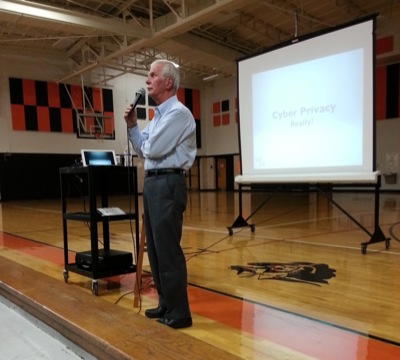Thursday, December 17th, 2015
Internet users warned about many dangers lurking online
By Jared Mauch

Photo by Jared Mauch/The Daily Standard
Rick Mann speaks to a group of about 60 people Wednesday night at the Coldwater Middle School about the dangers of cyberbullying, sexting, cyberprivacy and preventive measures parents and Internet users can take to avoid online dangers and protect personal information.
COLDWATER - People can protect themselves from the threats of cyberbullying and identity theft that can lead to blackmail and emptied bank accounts, an online safety expert said.
Rick Mann, an attorney, author and public speaker, Wednesday night warned a crowd of about 60 people at Coldwater Middle School about the dangers of online activity.
He gave several tips to protect oneself while online, starting with becoming knowledgeable about threats, scams, applications and websites.
People can do their own research to determine how to stay away from dangerous websites, he said.
Parents should use online sites such as Urban Dictionary to stay up to date with words and phrases children use online, he said. They should also know how each application a child uses works and know the child's passwords.
Users need to realize they have very little privacy online. Websites such as Google and Facebook work with the government to provide information on people, he said.
People taking photos with smartphones can protect privacy by disabling geo-tagging, Mann said. Most photos have the date, time and a rough estimate of location attached to them. Disabling the function is simple and Mann said instructional websites show how to turn off the feature.
Mann stressed that what people post or say online is permanent even if they appear to delete it from the site on which it was originally posted.
"It's in some cloud somewhere or on some server in real life," he said.
He used the term cyberdisconnect to describe how people think their online actions have no real-world repercussions. They do, Mann warned.
"Not only is it permanent, you're responsible for the damage it causes. Once you hit click it's like a bullet. It doesn't matter what your intent was. If it did damage, you're responsible," Mann said.
Parents need to make sure their children know online actions can have implications, he added. Some interactions involve cyberbullying and it is tough to blame school officials for the actions.
"The schools have no right to check what the kids are doing on the Internet. Their right is limited to reasonable suspicion of a violation of school rules," he said.
Sleep texting is another phenomenon students are displaying, he said. The term coined by Ohio State University researchers describes late-night activities users perform after going to bed with a smartphone or Internet device, Mann said.
"It's exactly like sleepwalking. In other words, you are brought out of deep sleep into semi-sleep and you'll do that. The next day you'll have no memory of doing that," he said.
Mann suggested parents prevent their children from going to bed with electronic devices to eliminate this activity.
"Studies show the average American teenager loses one to two and a half hours of (rapid eye movement) sleep every night if they take a device to bed with them," he said.
Mann spoke to Coldwater students Wednesday and will speak to Marion Local and St. Henry students today.
